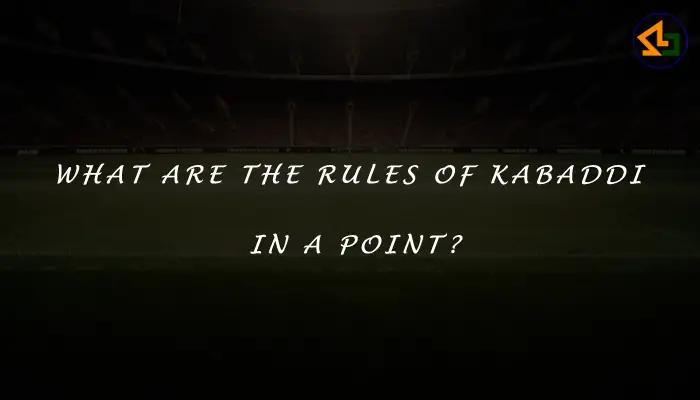Kabaddi is a captivating sport that has captured the hearts of millions around the world. It’s a high-energy, team-based game that combines strategy, agility, and physical prowess. In this comprehensive guide, we will explore the rules of Kabaddi in a point, providing you with a deep understanding of this sport’s intricacies. So, let’s dive in and unravel the world of Kabaddi!
Kabaddi: A Brief Overview
Kabaddi is a traditional sport that originated in India and has since gained popularity worldwide. It is often played in two variations: ‘kabaddi in a point’ and ‘standard kabaddi.’ Here, we will focus on the rules of Kabaddi in a point.
The Basic Rules
Kabaddi in a point follows a simple yet intense format. Two teams, each consisting of seven players, take turns to attack and defend. The attacking team sends one player, known as the ‘raider,’ into the opponent’s half, while the defending team tries to tag the raider. The raider’s goal is to touch as many defenders as possible and return to their half within a single breath, chanting “kabaddi, kabaddi” all along. If the raider is successful, the tagged defenders are declared ‘out.’
Scoring Points
- Each ‘out’ defender earns one point for the raiding team.
- If the raider successfully tags all defenders and returns to their half, they earn an additional point for their team.
Regulations and Dimensions
To maintain fairness and safety, Kabaddi has specific regulations and field dimensions:
- Play Area: A rectangular field divided into two halves.
- Duration: Matches are typically played in two halves, each lasting 20 minutes.
- Raider Limit: A raider has a maximum of 30 seconds to complete their raid.
- Crossovers: Raiders must cross the ‘bonus line’ to earn extra points.
- Team Rotations: Teams rotate raiders to maintain a fair game.
Fouls and Penalties
Kabaddi has its fair share of fouls and penalties, and it’s essential to know them:
- Self-Out: If a raider touches their own body, they are out.
- Going Out of Bounds: Stepping out of the boundary results in an out.
- Struggling for Breath: If a raider loses their breath and cannot chant “kabaddi,” they are out.
- Physical Contact: Excessive force or dangerous play can lead to penalties.
FAQs (Frequently Asked Questions)
How is Kabaddi scored?
In Kabaddi, points are scored by the raiding team when the raider successfully tags defenders and returns to their half. Each tagged defender earns one point, and additional points can be scored by crossing the bonus line.
What happens if a raider fails to return in time?
If a raider fails to return to their half within the 30-second limit, they are declared out, and no points are awarded.
Are there any restrictions on the raider’s movements?
Raiders must stay within the opponent’s half, and crossing the boundary is considered a foul. They must also avoid self-touch, as it results in an out.
Can defenders use force to stop the raider?
Defenders can use legal force to stop the raider but must avoid excessive physical contact. Dangerous play can lead to penalties.
How is the winning team determined?
The team with the most points at the end of the match wins. In case of a tie, a ‘super raid’ or ‘extra time’ may be used to determine the winner.
Is Kabaddi a physically demanding sport?
Yes, Kabaddi requires a high level of physical fitness, agility, and strategic thinking. Players need to be quick on their feet and possess great endurance.
Conclusion
Kabaddi in a point is a thrilling sport that combines strategy, skill, and teamwork. Understanding the rules and regulations is essential for both players and fans. Now that you have a comprehensive insight into the rules of Kabaddi in a point, you can enjoy the game with a deeper appreciation. So, gather your friends, watch a match, or even give it a try yourself—it’s a sport that guarantees excitement!
That’s all! You can also checkout: What is your opinion about star sports Pro Kabaddi? and What is kabaddi?







